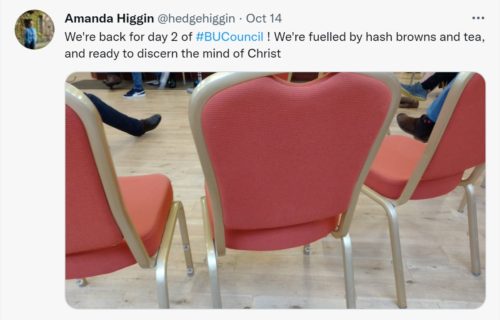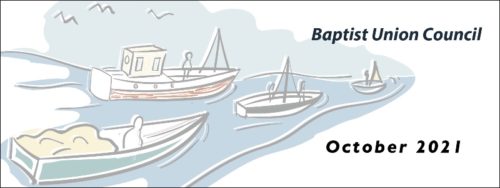Guests to Each Other: A Regent’s Ministerial Student reflects on attending Baptist Union Council 2021
Date: 22/10/2021
Amanda Higgin is a graduate student reading for the MPhil in Theology (2020), with a focus on the New Testament, as well as being on the Regent’s Ministerial Formation programme. In this blog she reflects on her first time attending the Baptist Union Council, which meets twice a year and helps to set the broad strategic direction of the Union.
At the head of every great structural network, there must be a decision-making brain. Usually this has a vague and shadowy name: the Illuminati, the Governing Body, Synod. The brain of the Baptist Union is known only as ‘Council’. Twice a year, it gathers from across the nation the gifted and chosen movers and shakers committed to that most elusive of pursuits: ‘discerning the mind of Christ’. And this year, I was plucked from the masses to join them.
Turns out they’re all quite normal, actually.
Unlike other denominations and national structures, most of the decision-making power in the Baptist Union of Great Britain (BUGB – pronounce it ‘bug bee’) belongs not to its national brain but to its local congregations. As we were reminded before Council, our purpose was to be ‘the key location of strategic leadership and oversight for the Union‘. Council brings together a representative sample of individuals from across the Baptist world, in order to pray and consider current issues together. We only actually voted on two items: appointment of key roles to lead the Union, and new ideas for funding for ministerial students (something close to my heart!). Otherwise, we heard, considered, and fed back without formal voting – and the record of our conversations will be offered as guidance to churches.
I talk about church and theology all the time. I’d call it my day job, except that I don’t get paid to do it. I spend all day in the library reading books about the New Testament, engage with live ecumenical debates every time I check Twitter, and learn about church issues both formally and informally through my ministerial formation at Regent’s. So, I should be right at home at Council discussing the Baptist church and its theology.
I had to travel for four hours to get to the conference centre in Swanwick, near Derby. On the journey, it struck me that the location of Council is no coincidence. The location is nationally central for far-flung participants, but it would have been easy to shift the meeting place south for the benefit of the group of specialist team leaders coming from Baptist House in Didcot. The journey to Swanwick decentralised my own southernness, undermining the preference for the South that so many of our national institutions learn by being based in and around London. As we all travelled to Council from our homes to a conference centre that was home to nobody, we all became guests to each other.

Live-tweeting from the second day of the Baptist Union Council.
That pattern of gathering is one I recognise from my own ministerial formation. Every Tuesday, congregation-based ministerial trainees gather into Regent’s Park College, Oxford, from their respective training churches, and we form a community in which we shape, challenge, and encourage each other before dispersing, taking what we have learned back to our respective contexts. That pattern of gathering, resourcing, and returning is a key Baptist pattern. After all, that’s what we do at every Sunday church service: gather from our homes and jobs, empower each other as community, and return home with what we have learned.
I was genuinely impressed at Council by the commitment to diversity and mutual listening. As a 23-year-old newbie, I expected to sit quietly through the discussions. Instead, I felt encouraged to contribute to and even to challenge the motions and, between sessions, I was emboldened to have in depth discussions about ministerial formation. During coffee breaks people came to introduce themselves and ask about my research, so I was able to rehearse my elevator pitch and work out what I thought my dissertation research might contribute, in time, to the wider Baptist world.
The Baptist ethos of plurality and community, ‘unity without uniformity’ as one minister put it, is a tension that informs all our decision-making. This is not to say that we all agreed on everything, but what I saw at Council was a commitment to holding that tension, and to listening to this fresh-faced trainee in the process.
I am now an indefinite part of the Baptist Union brain, and look forward to returning to Council in March!
Read the Baptist Union Council October 2021 Report here:

